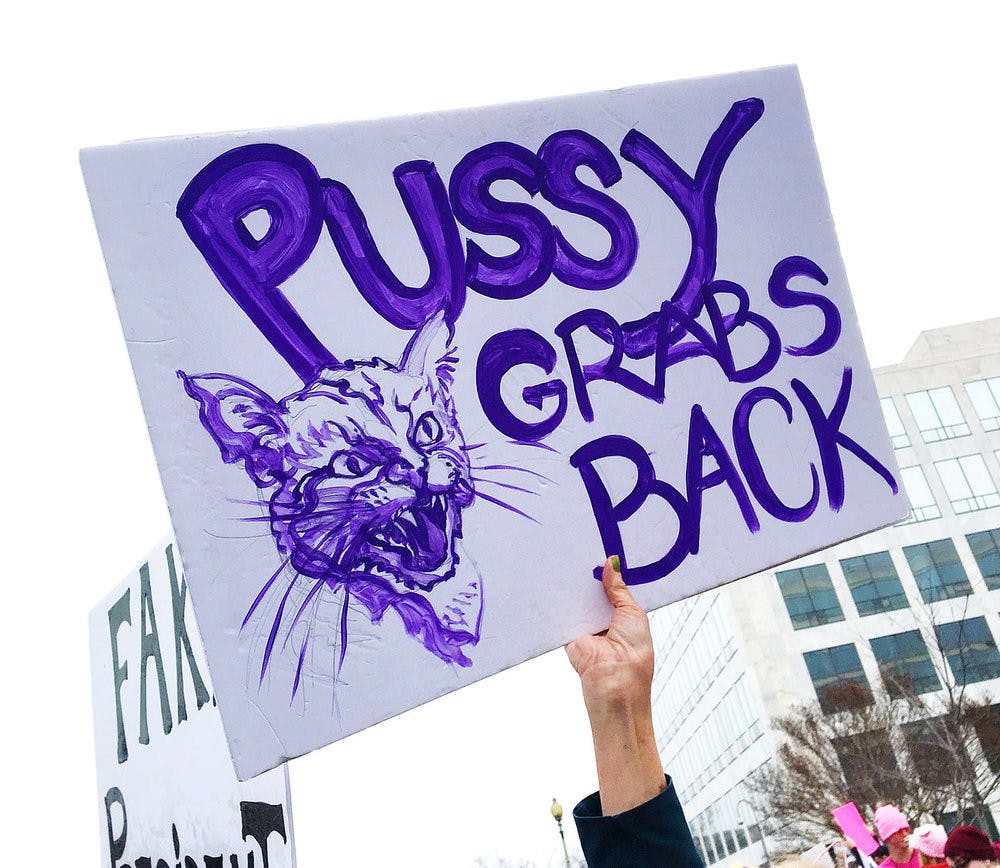BY: JENNA CALDWELL

"My neck. My back. My pussy will grab back," read one of the many signs displayed at the 2017 Women's March on Washington. A historical gathering, over 500,000 women (and men) flooded the streets of the nation's capital showcasing their feminism and activism through creative posters, loud voices and "pussyhats." Pussyhat was a projectaimed at reclaiming the derogatory term for the female genitalia. The hats created a "visual statement" of unity throughout the march.
On the frontier, the Women's March appeared to be an intersectional all-inclusive event. With speakers ranging from America Ferrera and Angela Davis to Raquel Willis and Linda Sarsour, women of all colors and faiths were represented. According to its website, "the National Co-Chairs and Organizers were established to reflect a balanced representation. The team of organizers and volunteers are committed to ensuring that the march reflects women and femme expressive people of all backgrounds." Unfortunately, the march failed to properly represent many of those who identify as women, sex workers and pro-life advocates.
Reminder: Not all women have a vagina. The overwhelming use of vaginal imagery throughout the demonstration isolated the transgender community. Despite the pussyhats' intended goal of unifying all women, they instead alienated many. With signs like "Pussy Power," "Viva la Vulva" and "Pussy Grabs Back" in addition to attendees dressed as the female organ, we have forgotten that being intersectional is more than including women of different skin tones belonging to different churches.
It took a lot of courage to be a woman and trans yesterday at the #WomensMarch. #Feminism can do better. #transgender pic.twitter.com/KMxQnxvES8
— Sophie Labelle (@AssignedMale) January 22, 2017
Not only was an entire demographic of people made to feel uncomfortable throughout the march, but many were left voiceless. Prior to Saturday's demonstration, a statement of "unity principles" for the march pledged to "stand in solidarity with sex workers' right movements." Shortly after, this line was removed from the Women's March platform and replaced with a statement promising to stand in solidarity "with all those exploited for sex and labor." This change sparked outrage from many in support of sex worker's rights. The harsh social media backlash is what may have inspired the organization to update their stance once more before the march to "We stand in solidarity with the sex workers' rights movement. We recognize that exploitation for sex and labor in all forms is a violation of human rights." No clarification was provided on this change.
Although met with applause, feminist icon Gloria Steinem's speech was also critiqued for saying, "There are women here, I know, who have survived a national and global sex industry that profiteers from body invasion," which is an unfair characterization of all sex workers as victims.
Finally, the Women's March has denied partnerships and removed several pro-life groups from their list of partners prior to the demonstration. Many women took to social media to express their concerns over a pro-life group being present at the march.
Intersectional feminism does not include a pro-life agenda. That's not how it works! The right to choose is a fundamental part of feminism.
— roxane gay (@rgay) January 16, 2017
Horrified that the @womensmarch has partnered w/an anti-choice org. Plse reconsider - inclusivity is not about bolstering those who harm us.
— Jessica Valenti (@JessicaValenti) January 16, 2017
Agree or disagree with pro-choice organizations, the transgender community or sex workers, these are women whose voices should not be stripped, especially during a women's demonstration.


